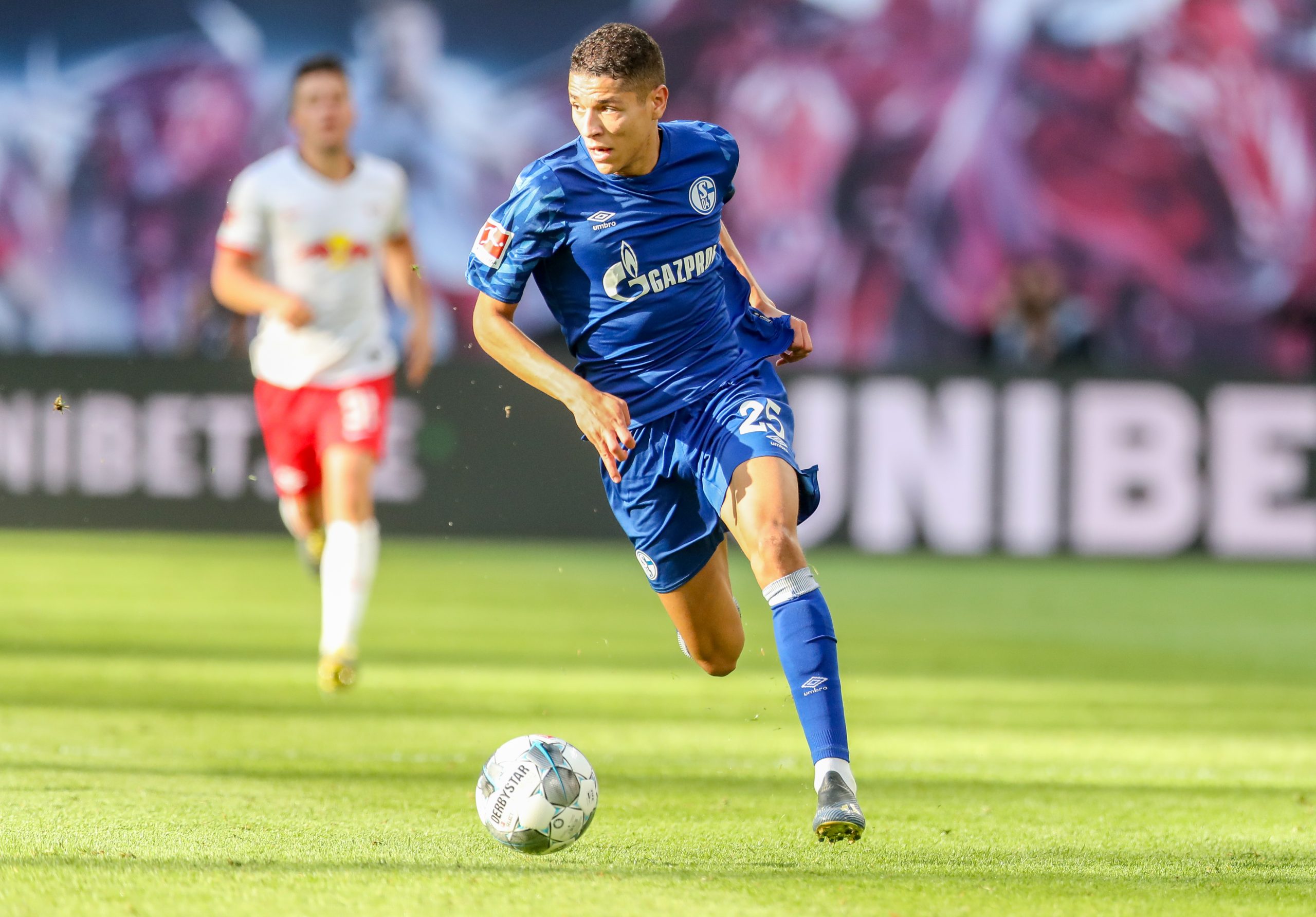When Schalke edged Mainz on matchday five, thanks to Amine Harit’s excellent outside of the boot winner, they had made it three wins in a row and people in German football began to take notice. That sort of streak is not exactly what Schalke fans are used to. They won six in a row in the spring of Domenico Tedesco’s miraculous second place season. The Royal Blues also had just two two game winning “streaks” in a dismal last season that saw them gain 33 points from 34 matches. Even more impressively, they followed up that Mainz result with a 2-1 victory over then league leaders RB Leipzig. It was Schalke’s first win against a team in the top spot in 14 tries and now they are the talk of Germany. You see, Ruhrpott giants and one of the Bundesliga’s best-supported clubs, Schalke are a team of extremes, with little room for anything in-between. 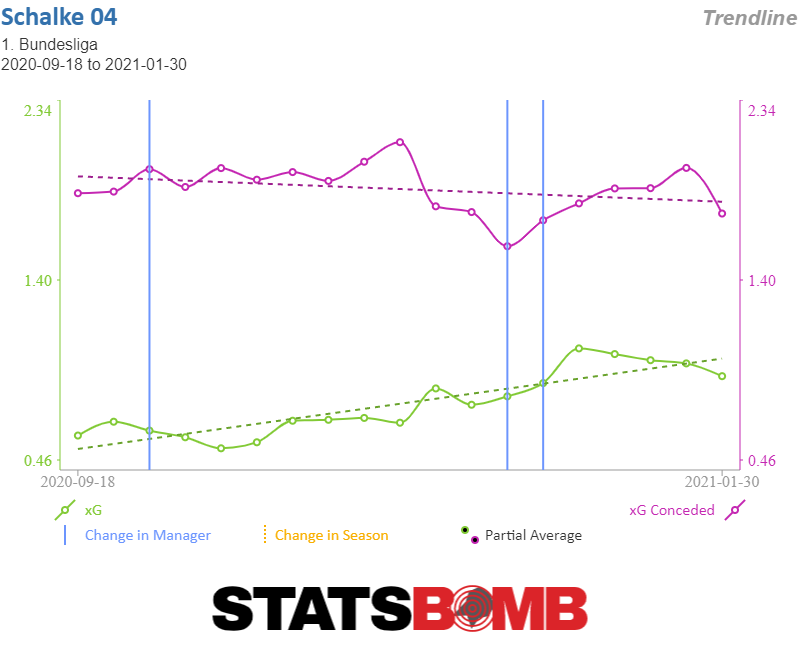
Addition by squad subtraction
Schalke are now on their fourth permanent head coach in five seasons, David Wagner, the German-born American/Klopp best man of Huddersfield Town fame. Schalke have exhausted a range of coaching philosophies - going from Andre Breitenreiter to Markus Weinzierl to Domenico Tedesco and then, on an interim basis, Huub Stevens. RB Leipzig’s Jochen Schneider was appointed to the front office right around the time the team was bus getting thrashed 7-0 by Manchester City in the group stages of last season’s Champions League. He helped lead a squad overhaul along with long-time Bundesliga squad planner (with stints at both Bayer Leverkusen and Bayern Munich) and now technical director, Michael Reschke. Reschke joined Schalke from Stuttgart over the summer, cleverly exercising a 15 million Euro buyout clause to bring with him 19-year-old Turkish center back phenom Ozan Kabak, who he originally signed for Stuttgart in January, then for Stuttgart. With just four minutes played so far in the league due to a preseason injury, it’s hard to call Kabak the catalyst to Schalke’s success and the same can be said of the speedy winger addition of Benito Raman (6.5m from Düsseldorf) who is scoreless in 192 minutes. The real addition, aside from the useful young English fullback Jonjoe Kenny, who has quickly nailed down the right back spot, has been via subtraction. First, there came the departures of the perennially disappointing/injured Breel Embolo (last seen missing chances at Gladbach) and failed young guys like Hamza Mendyl - the speedy left back’s lasting memory will be Tedesco desperately throwing him on as a striker against Borussia Dortmund in the Revierderby in a move that makes FIFA novices shudder. Then, Schneider and Reschke tried to erased the overpaid reaches of former sporting director Christian Heidel. All in all Heidel spent 82.5 million on five players, whom Schalke was able to sell for 11.5 million (Embolo and Yevhen Konoplyanka) with Sebastian Rudy and Hamza Mendyl needing to go out on loan, and former Spurs player Nabil Bentaleb - rehabbing a knee injury - finding no takers in the summer. Of course, the balance sheet of Heidel isn’t all bad, as several of the current key Schalke players were brought in under his tenure. There is the versatile Benjamin Stambouli, who settled in at center back, and the rejuvenated Omar Mascarell who, thanks to David Wagner’s transition into a pressing oriented system,is slowly recapturing his form in the number six role that caught the eye of many in Niko Kovac’s Frankfurt. Also, in six games so far, Suat Serdar's production has simply exploded with almost every single aspect of the 22 year-old's game exploding. He also looked like the best player on the pitch against Leipzig. 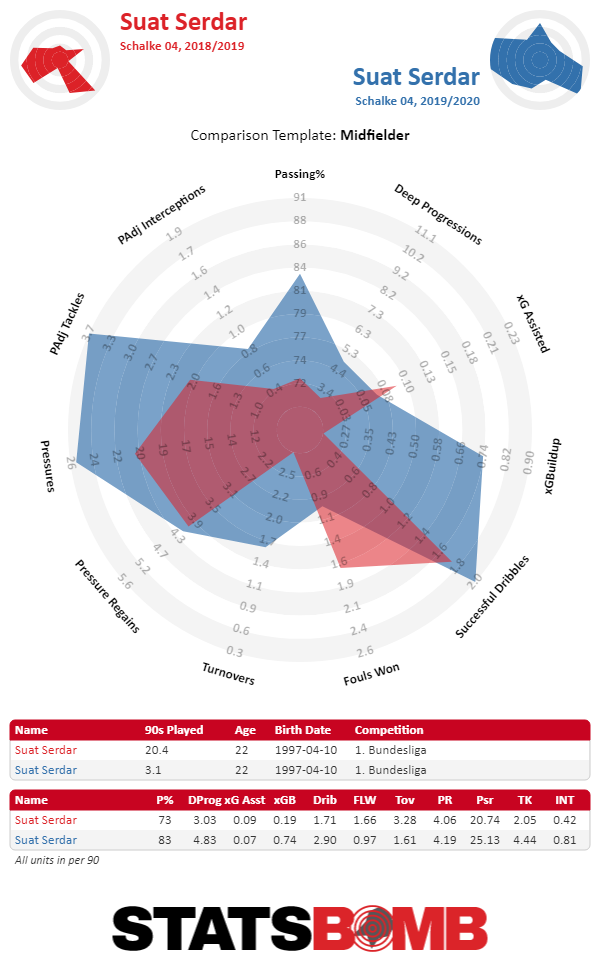 The star of the bunch is of course Amine Harit, whom our Sam Planting identified as recapturing his 2017\18 early season magic. Far be it for me to rub salt into those very open Dortmund wounds (yes, we SHOULD be worried about BVB), but many in Gelsenkirchen still fondly recall the time when Harit came on in the 32nd minute down 4-0 to BVB and turned the game around with his dribbling and ability to draw fouls, leading to one of the most remarkable 4-4 draws in recent memory. Even if his goalscoring cools down and he stops scoring all his shots inside the box, Schalke’s transition-heavy attack can rely on his individual ability to draw fouls (the penalty against Leipzig) and Serdar’s improved ball progression to at least generate something.
The star of the bunch is of course Amine Harit, whom our Sam Planting identified as recapturing his 2017\18 early season magic. Far be it for me to rub salt into those very open Dortmund wounds (yes, we SHOULD be worried about BVB), but many in Gelsenkirchen still fondly recall the time when Harit came on in the 32nd minute down 4-0 to BVB and turned the game around with his dribbling and ability to draw fouls, leading to one of the most remarkable 4-4 draws in recent memory. Even if his goalscoring cools down and he stops scoring all his shots inside the box, Schalke’s transition-heavy attack can rely on his individual ability to draw fouls (the penalty against Leipzig) and Serdar’s improved ball progression to at least generate something.
Wagner focuses on playing without the ball
Wagner’s Schalke still defines itself primarily against the ball. Having abandoned the 5-3-2, they now play a flexible 4-2-3-1 with some high and intense counterpressing, often with 7-8 players on the ball side. The more aggressive defensive approach has, so far, improved the sides overall performance. 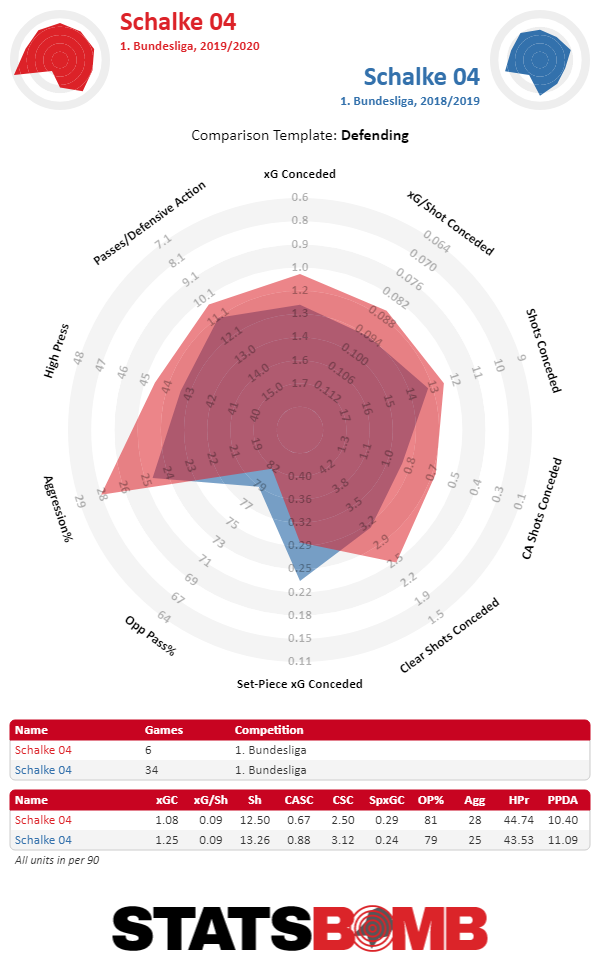 It remains relatively early days, so things can change rapidly, but the defensive heatmap from Schalke this season shows a lot of action all over the pitch.
It remains relatively early days, so things can change rapidly, but the defensive heatmap from Schalke this season shows a lot of action all over the pitch. 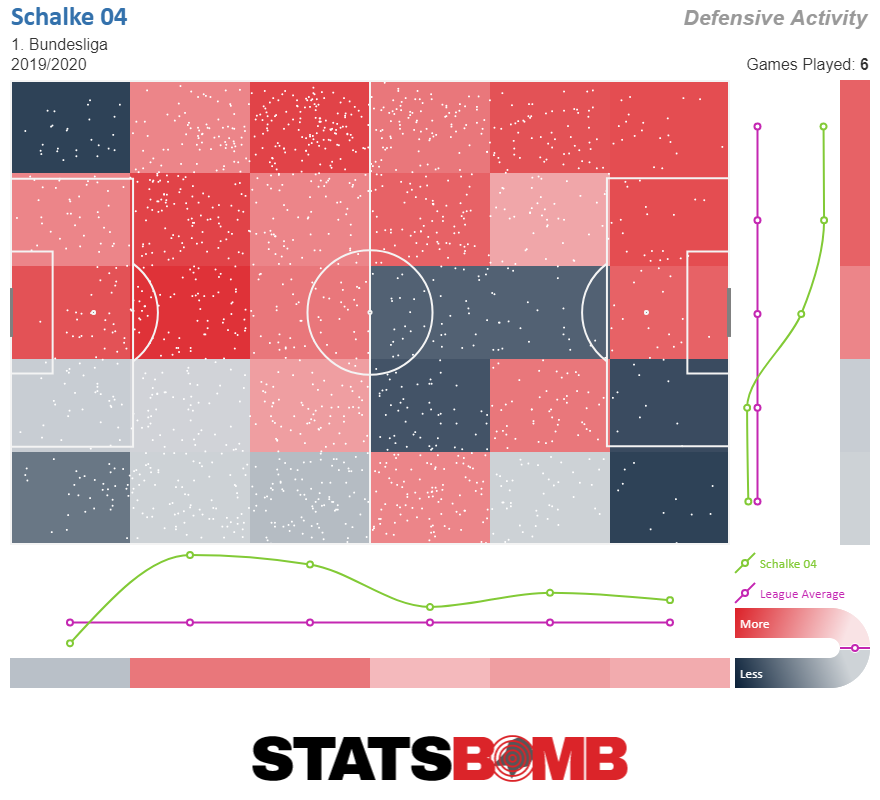 Last season Schalke's defensive approach was considerably less high action.
Last season Schalke's defensive approach was considerably less high action. 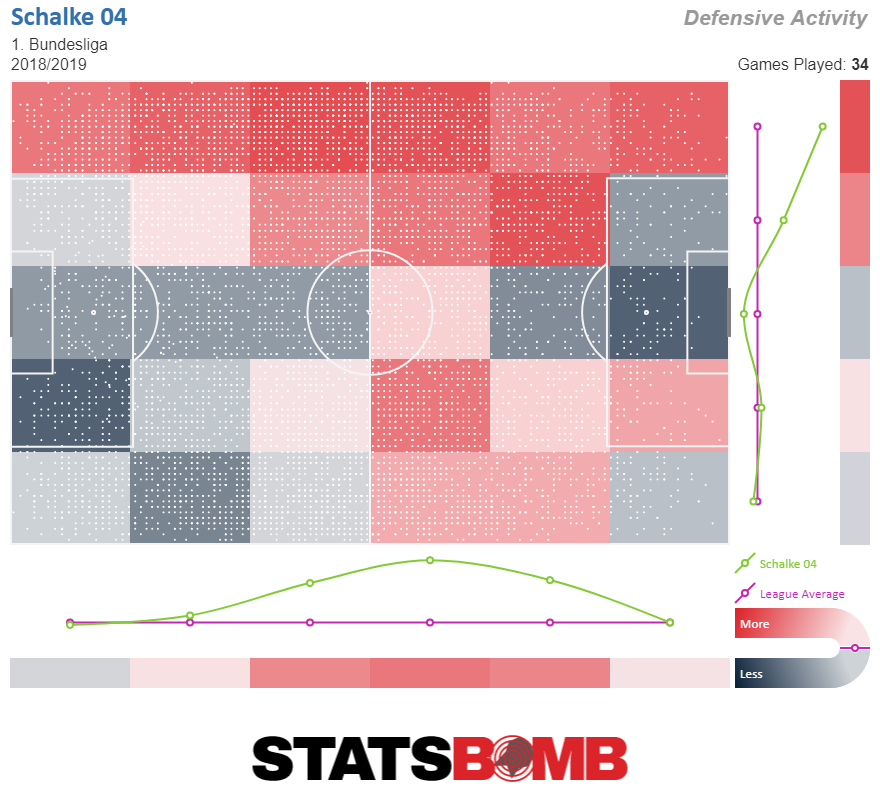 The front of the 4-2-3-1 features Guido Burgstaller, yet another player who has benefited tremendously from Wagner's arrival.
The front of the 4-2-3-1 features Guido Burgstaller, yet another player who has benefited tremendously from Wagner's arrival. 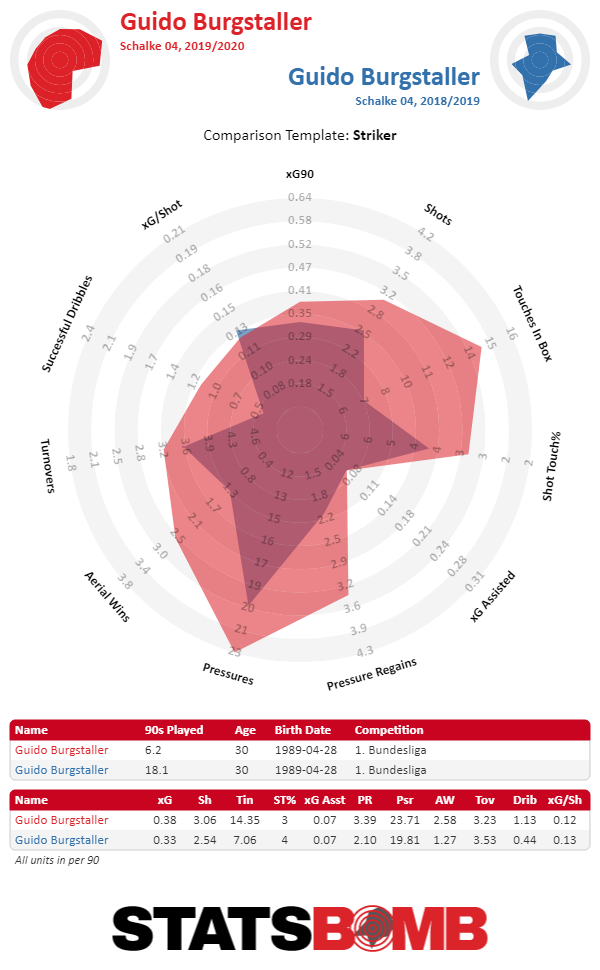 That said, goal scorer remains a problematic position. Nobody on this team is close to Burgstaller's xG total.
That said, goal scorer remains a problematic position. Nobody on this team is close to Burgstaller's xG total. 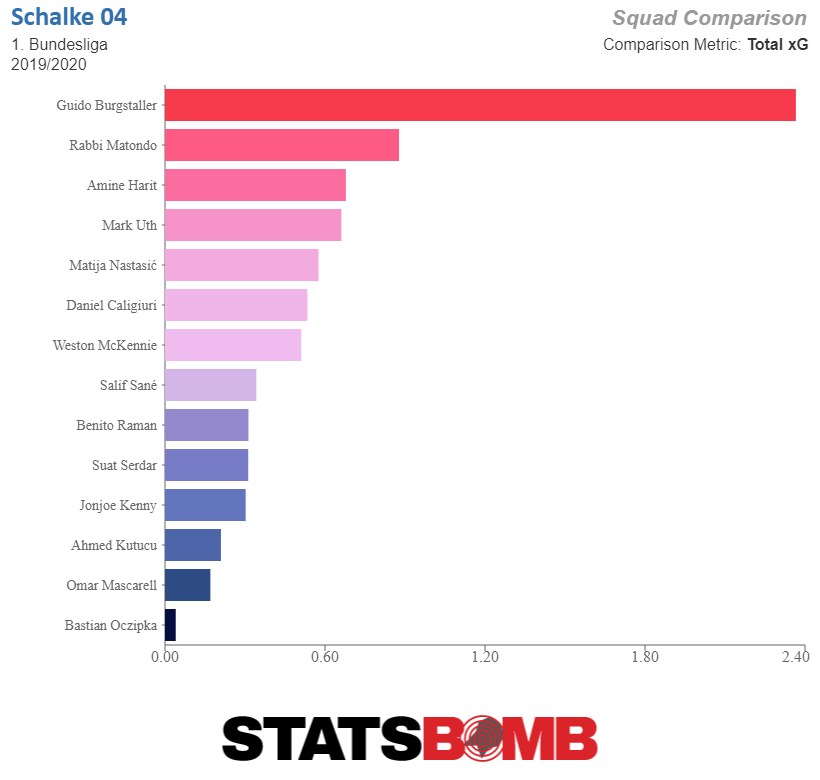 And this comes after last season where there was very little in the way of goal scoring threat anywhere on the squad.
And this comes after last season where there was very little in the way of goal scoring threat anywhere on the squad. 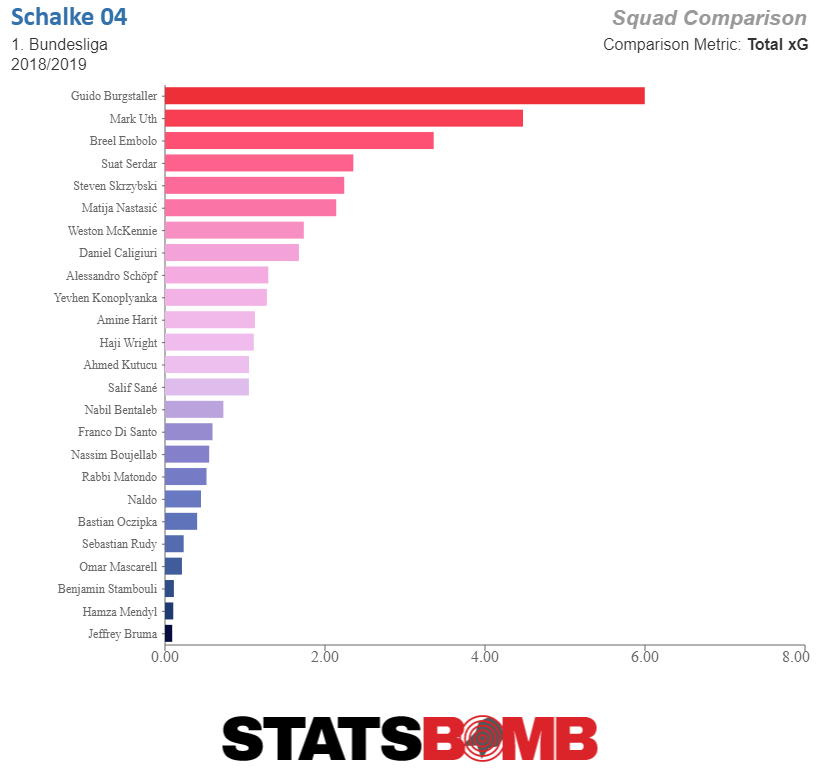 Wagner has shown some excellent tactical creativity by dusting off and playing little-used Rabbi Matondo at second striker. In what looked like a narrow 4-4-2, (perhaps a 4-3-1-2 with Harit behind the strikers), the Welshman’s pace gave their counters another dimension against Leipzig, and left Nagelsmann befuddled. Matondo walked away with five shots, a goal and 0.88 xG.
Wagner has shown some excellent tactical creativity by dusting off and playing little-used Rabbi Matondo at second striker. In what looked like a narrow 4-4-2, (perhaps a 4-3-1-2 with Harit behind the strikers), the Welshman’s pace gave their counters another dimension against Leipzig, and left Nagelsmann befuddled. Matondo walked away with five shots, a goal and 0.88 xG. 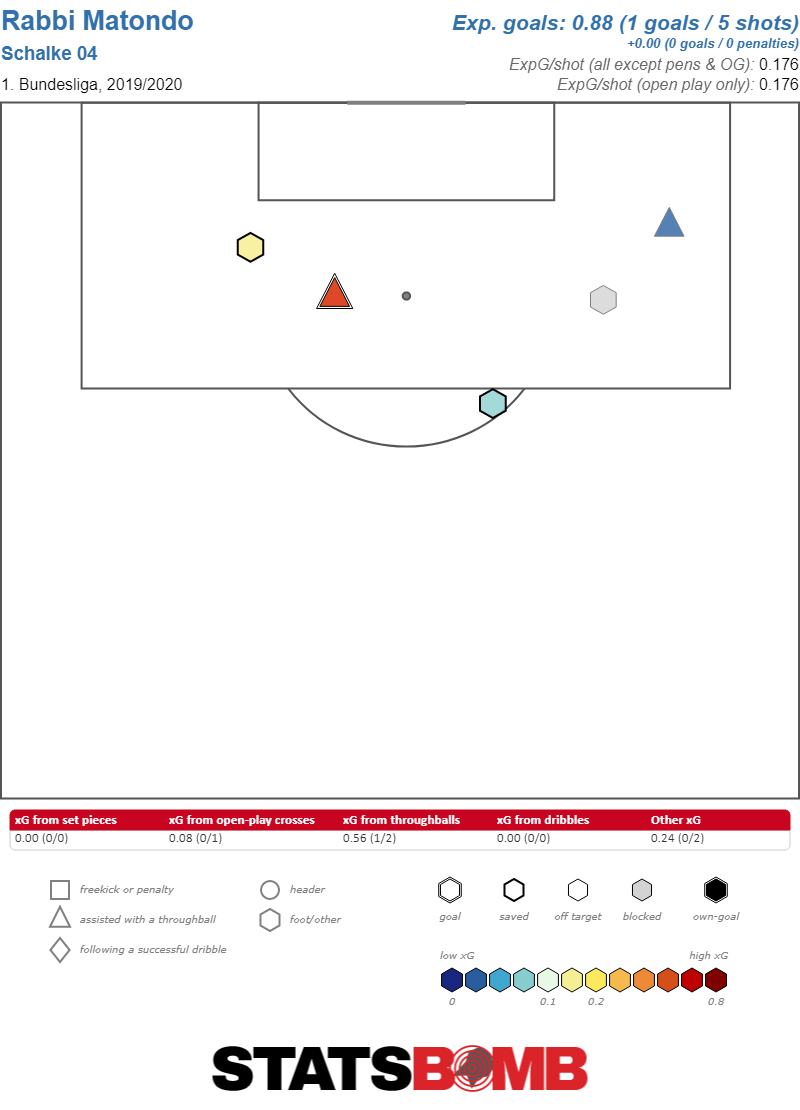 Still, given the attacking struggles though, it's no wonder the excellent fellas over at Schalkemerica have started the #freeKutucu movement, in an effort to play the 19-year-old Turkish striker, about whom Manchester City inquired in the summer. Behind the striker, Wagner has played former right back Daniel Caligiuri as a traditionally dribbling and pressing winger on the right, though his performances have not been great. On the left, there is Amine Harit, who can move into the ten spot, but also take Benito Raman’s spot as a creative inverted winger on the left. Aside from the aforementioned goals, creativity and dribbling, Harit is also a functional defensive contributor. Raise your hand, if you had Harit - the same player who was banned from a Duisburg casino in January for “his own good” - as a natural fit at winger for a team implementing an intense counterpressing system. At the ten/eight spots they alternate two incredibly dynamic and versatile players in Serdar and Weston McKennie, who is equally capable of pressing as a second striker, as he is at joining Mascarell in the double pivot. With that kind of organization, positional flexibility, intensity and athleticism, Schalke can hold a lot of teams for big spurts. That includes Bayern, who even tried a funky use of David Alaba as a false full back alongside the now regular number six Joshua Kimmich, but were for large portions of the game, unable to break through the Royal Blues pressing. https://twitter.com/BundesPL/status/1165929569460924416?s=20 And of course, Leipzig, whose XG flatlined after Nübel’s double save on Forsberg and Sabitzer in the 16th, with the Austrian shattering the crossbar a minute earlier.
Still, given the attacking struggles though, it's no wonder the excellent fellas over at Schalkemerica have started the #freeKutucu movement, in an effort to play the 19-year-old Turkish striker, about whom Manchester City inquired in the summer. Behind the striker, Wagner has played former right back Daniel Caligiuri as a traditionally dribbling and pressing winger on the right, though his performances have not been great. On the left, there is Amine Harit, who can move into the ten spot, but also take Benito Raman’s spot as a creative inverted winger on the left. Aside from the aforementioned goals, creativity and dribbling, Harit is also a functional defensive contributor. Raise your hand, if you had Harit - the same player who was banned from a Duisburg casino in January for “his own good” - as a natural fit at winger for a team implementing an intense counterpressing system. At the ten/eight spots they alternate two incredibly dynamic and versatile players in Serdar and Weston McKennie, who is equally capable of pressing as a second striker, as he is at joining Mascarell in the double pivot. With that kind of organization, positional flexibility, intensity and athleticism, Schalke can hold a lot of teams for big spurts. That includes Bayern, who even tried a funky use of David Alaba as a false full back alongside the now regular number six Joshua Kimmich, but were for large portions of the game, unable to break through the Royal Blues pressing. https://twitter.com/BundesPL/status/1165929569460924416?s=20 And of course, Leipzig, whose XG flatlined after Nübel’s double save on Forsberg and Sabitzer in the 16th, with the Austrian shattering the crossbar a minute earlier. 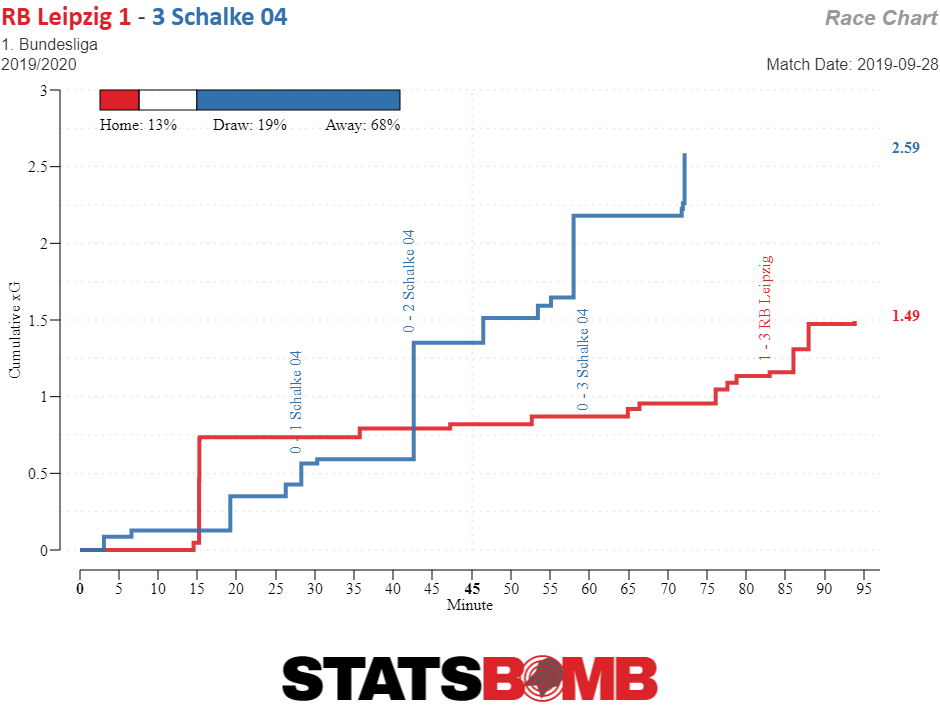 In terms of their attacking structure, Wagner plays with 2 center backs and when pressed by two strikers like against Paderborn, Omar Mascarell drops in between them. Yet, due to some structural issues (Serdar\McKennie don’t always get into proper receiving position) and particularly Salif Sané’s risk averse passing, their ball progression from the back, is still a work in progress. It consists mostly of Stambouli’s usually excellent long passes, or a hoofed ball under pressure by the goalkeeper, Alexander Nübel, which if Burgstaller is able to control or lay off can work, considering the athleticism of Harit/Raman/McKennie/Caligiuri/Serdar. Otherwise, Schalke aim to progress the ball through switches to free up one of the fullbacks who then plays a one two with the 8s\ and either bombs down the flank or finds Amine Harit to create something. Under Wagner, set pieces have reappeared as an integral part of the game plan, with three goals on 18 shots. That’s almost half of the 6 goals on 122 shots last season and one direct free kick goal on 18 tries. It’s not quite at the otherworldly 14 (!!) goals on 100 shots plus 2 direct free kicks in the silver medal season under Tedesco, but they're clearly getting results. The dynamic is somewhat complicated. Their set piece xG is not all that impressive, in fact at 0.25 per match it's the seventh lowest in the league.
In terms of their attacking structure, Wagner plays with 2 center backs and when pressed by two strikers like against Paderborn, Omar Mascarell drops in between them. Yet, due to some structural issues (Serdar\McKennie don’t always get into proper receiving position) and particularly Salif Sané’s risk averse passing, their ball progression from the back, is still a work in progress. It consists mostly of Stambouli’s usually excellent long passes, or a hoofed ball under pressure by the goalkeeper, Alexander Nübel, which if Burgstaller is able to control or lay off can work, considering the athleticism of Harit/Raman/McKennie/Caligiuri/Serdar. Otherwise, Schalke aim to progress the ball through switches to free up one of the fullbacks who then plays a one two with the 8s\ and either bombs down the flank or finds Amine Harit to create something. Under Wagner, set pieces have reappeared as an integral part of the game plan, with three goals on 18 shots. That’s almost half of the 6 goals on 122 shots last season and one direct free kick goal on 18 tries. It’s not quite at the otherworldly 14 (!!) goals on 100 shots plus 2 direct free kicks in the silver medal season under Tedesco, but they're clearly getting results. The dynamic is somewhat complicated. Their set piece xG is not all that impressive, in fact at 0.25 per match it's the seventh lowest in the league. 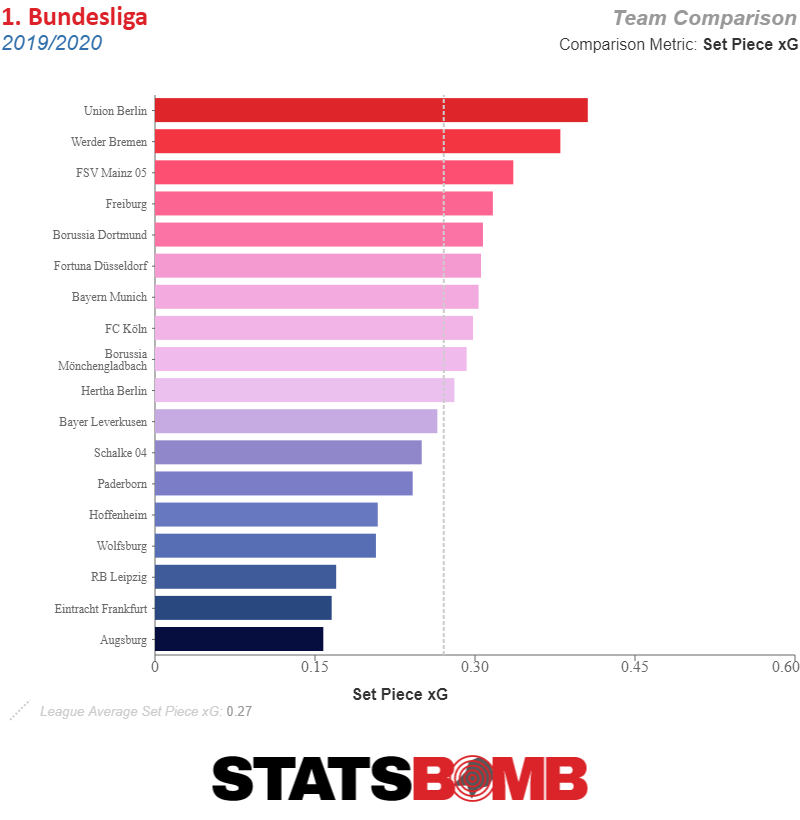 But that's mostly down to a lack of opportunities. The three shots per match they're averaging from set pieces is one of the lowest totals in the league. They team seems to do good set piece work when they have the chance to, they could just benefit from more chances.
But that's mostly down to a lack of opportunities. The three shots per match they're averaging from set pieces is one of the lowest totals in the league. They team seems to do good set piece work when they have the chance to, they could just benefit from more chances. 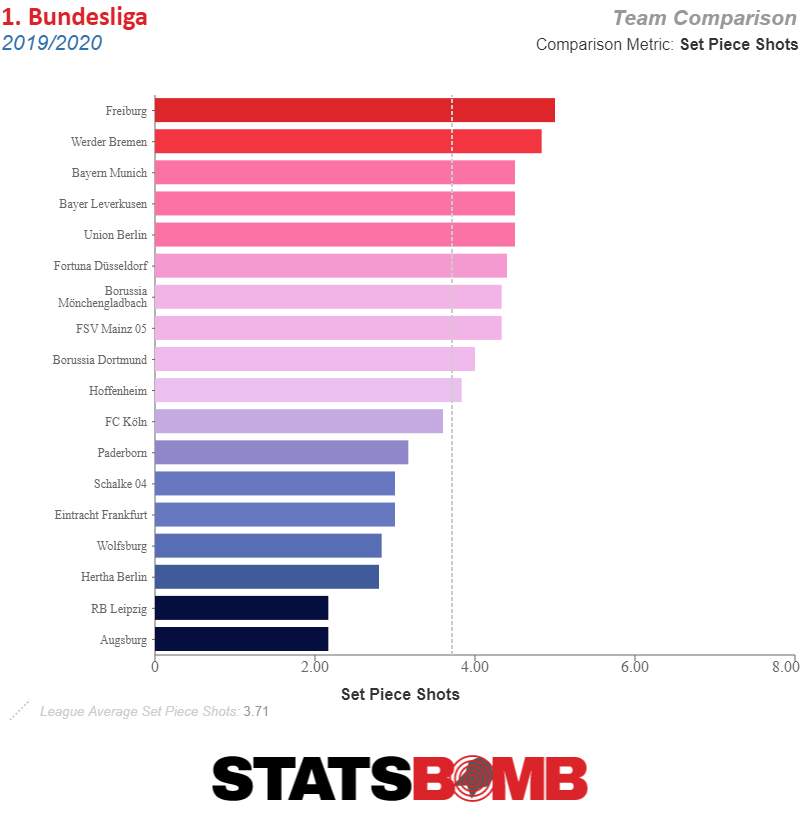
Cooling the hype train with numbers
Amidst all the positivity, there is some cause to be cautious, though that word is not exactly a household item in the Gelsenkirchen area. There is the fact that before the Leipzig triumph, 3 victories came against Hertha Paderborn and Mainz, three of the four lowest ranked Bundesliga teams. The 3-0 over Hertha was with the help of two own goals and it took nearly 270 minutes for Jonjoe Kenny to finally score the first goal by an actual Schalke player. The numbers, albeit improved from a dismal last season that saw them way underperform, also should cool some of the Schalke hype: shots against is down from 13.26 to 12.5, a respectable seventh in the league and non-penalty xG against is down from 1.25 to 1.08. the fourth best Bundesliga mark. Pair that with a 1.31 xG per match tally on the attacking side of the ball and you get a 0.23 xG difference. That's good, but it's not third place good. 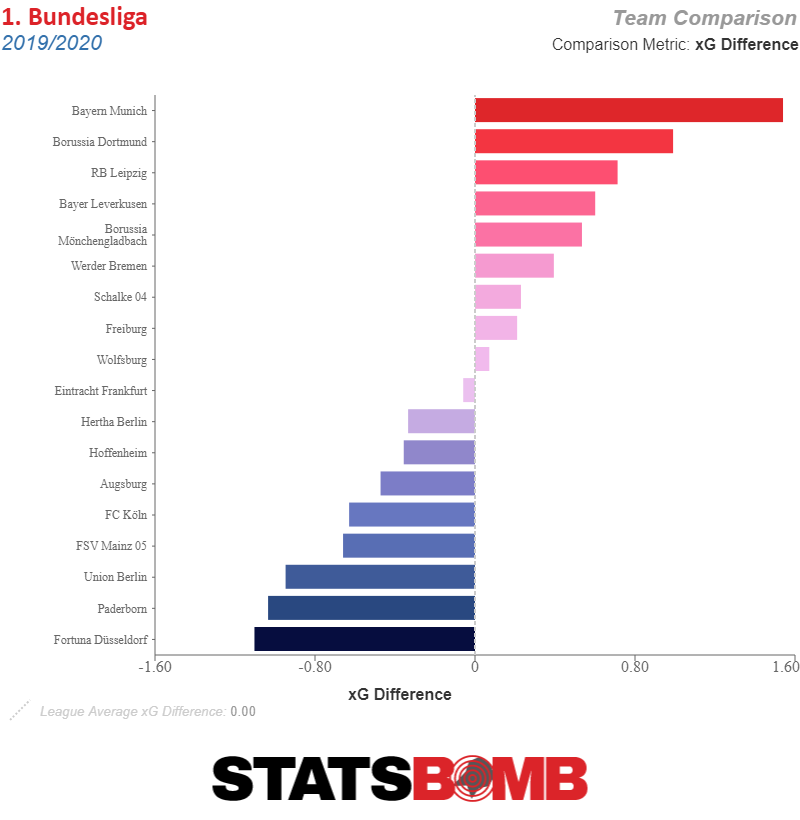 Still, thirteen points from six games is an amazing and unexpected haul considering they were without a point in their first five matches last year. The reality of this team falls somewhere between the two extremes of 14th and second place in the previous two campaigns. The good news from a Schalke perspective is that neither last year’s signing Mark Uth, nor the new ones in Raman and Kabak have added much. Before matchday six, the top three looked like Bayern, Leipzig and BVB in some order, but as Dortmund continue to be extremely worrying there are some other candidates: Leverkusen and Gladbach appear to be righting the ship after getting spanked by BVB and Leipzig and failing in Europe, while Wolfsburg shipped the fewest xG against (non-Bayern Munich division) Then, there is Schalke who could sneak in the back door despite having, in late August, a higher chance of being relegated than making the Champions Leagie, according to fivethirtyeight.com. With four of the next five against struggling Cologne, Hoffenheim, Augsburg and Düsseldorf their slow climb up the table just might become an all out sprint. Header image courtesy of the Press Association
Still, thirteen points from six games is an amazing and unexpected haul considering they were without a point in their first five matches last year. The reality of this team falls somewhere between the two extremes of 14th and second place in the previous two campaigns. The good news from a Schalke perspective is that neither last year’s signing Mark Uth, nor the new ones in Raman and Kabak have added much. Before matchday six, the top three looked like Bayern, Leipzig and BVB in some order, but as Dortmund continue to be extremely worrying there are some other candidates: Leverkusen and Gladbach appear to be righting the ship after getting spanked by BVB and Leipzig and failing in Europe, while Wolfsburg shipped the fewest xG against (non-Bayern Munich division) Then, there is Schalke who could sneak in the back door despite having, in late August, a higher chance of being relegated than making the Champions Leagie, according to fivethirtyeight.com. With four of the next five against struggling Cologne, Hoffenheim, Augsburg and Düsseldorf their slow climb up the table just might become an all out sprint. Header image courtesy of the Press Association
